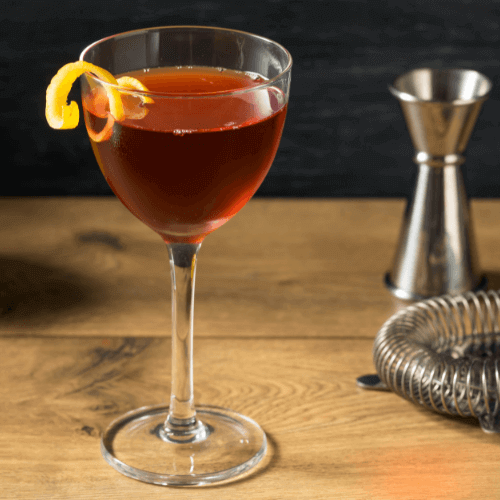Table of Contents The snifter glass is a type of glassware that is used to serve Bradney, bourbon, strong beer,...

Published in 1935, “The Old Waldorf-Astoria Bar Book” by Albert Stevens Crockett serves as a repository of cocktail history, preserving the recipes and stories of the drinks that once graced the bar at the renowned Waldorf Astoria Hotel. Among these creations, the Waldorf Cocktail shines as a testament to the hotel’s legacy and its contribution to the world of mixology.
The magic of the Waldorf drink lies not only in its flavor but also in its versatility. Mixologists have put their own spin on the classic recipe, introducing variations that incorporate additional elements to enhance the experience. Some renditions include a dash of aromatic bitters to elevate the drink’s aromatic appeal, while others experiment with different types of brandy or vermouth to create unique flavor combinations. This adaptability speaks to the cocktail’s timeless appeal and its ability to evolve with changing tastes while retaining its core essence.
Beyond its exquisite taste, the Waldorf Cocktail also embodies a sense of nostalgia and historical significance. Sipping on a Waldorf Cocktail is akin to taking a step back in time to an era when elegance, fine living, and refined taste were paramount. The cocktail carries the whispers of conversations between statesmen, artists, and socialites who frequented the grand halls of the Waldorf Astoria, leaving an indelible mark on both the cocktail and the hotel’s legacy.
As with any culinary creation, the Waldorf Cocktail is not without its critics or detractors. Some argue that the composition of its equal parts might lead to an overly balanced but less exciting flavor profile compared to more complex cocktails. However, it is precisely this simplicity that makes the Waldorf drink a refreshing and accessible choice for those seeking a refined drinking experience without overwhelming their palate.
60 ml rye whiskey
22.5 ml sweet vermouth
2 dashes of Angostura bitters
10 ml Absinthe, to rinse
Ice
Garnish: lemon twist

Rinse a coupe glass with absinthe and set aside.
Fill a mixing glass with rye whiskey, sweet vermouth, and Angostura bitters, and add ice.
Stir well, until chilled.
Strain into the coupe glass.
Garnish with a lemon twist.
“The Old Waldorf-Astoria Bar Book,” a treasure trove of cocktail history and recipes, can often be found in well-stocked bookstores, both online and offline. This book is a revered title among cocktail enthusiasts and history buffs alike, and its availability ensures that its timeless contents remain accessible to those seeking to explore the art of mixology and the legacy of the Waldorf Astoria Hotel. Major online retailers, dedicated bookshops, and platforms specializing in rare or vintage books are excellent places to search for this classic tome. Whether you’re a seasoned mixologist or a curious amateur, acquiring “The Old Waldorf-Astoria Bar Book” opens the door to a bygone era of cocktails and hospitality, allowing you to recreate and savor the flavors that once graced the renowned Waldorf Astoria bar.
Table of Contents The snifter glass is a type of glassware that is used to serve Bradney, bourbon, strong beer,...
Table of Contents In the world of cocktails, few drinks can boast the rich history and enduring popularity of the...
Facebook Print Email WhatsApp Table of Contents French cocktails have long held a reputation for their sophistication and timeless appeal,...
Facebook Print Email WhatsApp Table of Contents The Monte Cassino cocktail is a riff on the classic Last Word that...
MixDrinkiPedia.com is a participant in the Amazon.com Services LLC Associates Program. As an Amazon Associate we earn from qualifying purchases. Amazon and the Amazon logo are trademarks of Amazon.com, Inc. or its affiliates.